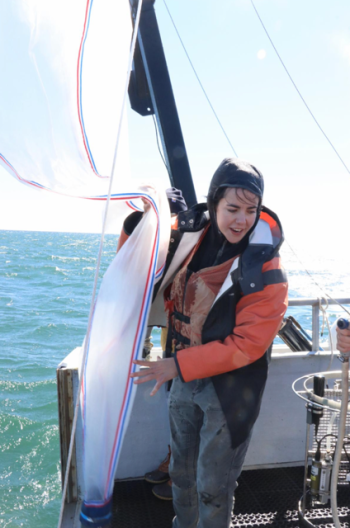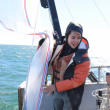Bigelow brings lobster conundrum to Carpenter’s Boat Shop
Maura Niemisto is bringing a bit of mystery to the November assembly of the Carpenter’s Boat Shop monthly Virtual Speaker Series.
“It is hard to name a symbol or icon as closely tied to the identity of Maine than the American lobster,” explains Niemisto, research associate at East Boothbay’s Bigelow Laboratory for Ocean Sciences.
The good news: “Over the past 40 years, egg production of this species in the Gulf of Maine has increased dramatically.”
The mystery: “Paradoxically, the number of young lobsters surviving to the juvenile stage has been decreasing in recent years,” a decline that begs the question of the fate of the early lobster larvae.
“What might be causing an assumed higher mortality rate?” Niemisto will ask the online Boat Shop audience. “Warming temperatures? Less food?”
The answers may be uncertain, but the Bigelow examination of the potential lobster dilemma is unrelenting. In her hour-long 7 p.m. session on Thursday, Nov. 2, Niemisto will review several years of research from a team that includes Dr. Rick Wahle, recently retired from UMaine's Darling Marine Center and Carpenter’s board member, and Dr. David Fields, Bigelow senior research scientist.
The goal of the Virtual Speakers Series, reports Alicia Witham, Carpenter’s executive director, is “connect, learn, and be inspired.” As such, she continues, “It broadens our reach of people being connected to the Boat Shop.
“What we're doing here at Carpenter’s is exposing individuals to different ways of being, whether you're choosing to be in the trades, you're choosing to be an artist, or choosing to be a craftsperson, or choosing to be a scientist.
For Bigelow Laboratory’s part, according to Leah Campbell, the institute’s science communications manager, the connection to Carpenter’s reflects the need to “have neighbors in the Boothbay region that are invested in understanding and protecting marine resources—in seeing the value in Bigelow Laboratory's work. And that has been invaluable for securing the support we need.
“The core of our work is research to understand the foundation of global ocean health, and we’re growing ways to share what we learn and apply it to urgent societal problems. That has huge benefits for marine ecosystems and coastal communities and businesses.”
Added Witham, “We are an educational institute and we’re looking to create the ability to get together and learn about new things in a very different kinds of educational formats,” whether that might involve a formal apprenticeship, participation in an occasional course (the subjects range from coastal navigation to building Adirondack chairs to fashioning small wooden Shaker boxes), or sitting at home on a November night to learn about the future of one of Maine’s most precious resources.”
Maura Niemisto’s program, Witham said, “gives is an opportunity to be together. And to connect, learn, and be inspired.
In addition to recounting her work with Drs. Wahle and Fields, the Thursday night gathering also will spotlight highlight related work conducted by University of Maine graduate students as well as undergrad interns at Bigelow Laboratory.
Upcoming Virtual Speakers include: Rick Miller, assistant professor at Maine Maritime Academy in Castine and master at the Sea Education Association in Woods Hole, MA. (Dec. 7); J.B. Smith, schooner captain and educator for such organizations as Vision Quest and Ocean Classroom Foundation (Jan. 25); and Phoebe Jekielek, director of research at Director of Research the Hurricane Island Center for Science and Leadership (Feb. 15).
For more information about the Carpenter’s Boat Shop, and to attend the Virtual Speakers series, email director@carpentersboatshop.com, log onto carpentersboatshop.org, or call 677-2614.




































